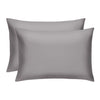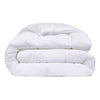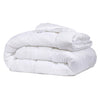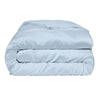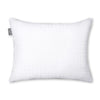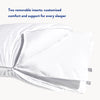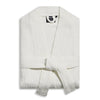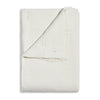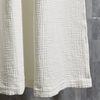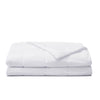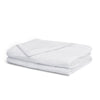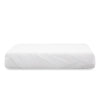The Daily Miracle
Are Satin Pillowcases Good For Skin?
Published
March 14, 2022
Author
Nicholas Crusie

Yes, satin pillowcases are known for being soft, but are they good for your skin? While we understand that satin pillowcases are huge right now, they might not be your skin’s preferred choice. It should be common knowledge that what type of sheets and pillowcases you sleep on can affect your skin.
You spend a lot of time sleeping; you spend roughly one-third of your sleeping or resting in bed. If you lived until 80 years old, you would spend around 26 years sleeping. If you're spending all this time in your bed, then your bedding should be of the highest quality.
Spending an extended period doing anything to your skin (good or bad) will merit results. Let's talk about why your bedding should be taken as seriously as part of your skincare routine.
How Do Different Fabrics Affect Your Skin?
When you think about lining up your healthy skin products, your skincare routine is probably what comes to mind. But, what if we were to tell you the fabrics your skin encounters every day can be just as important?
If you have a history of sensitive skin, fabrics sensitivity might not sound so foreign to you. But those who have never experienced fabric sensitivities may be surprised by our findings.
Your skin is the body's largest organ and is exposed to its fair share of daily toxics. Ensuring your skin is being taken care of correctly is essential to your body's overall health. Using quality products is just as crucial as guarding your skin against exposure from poor or low-quality fabrics too.
Like with foods, the more processed an item, the worse it is for you. If you have sensitive skin, chances are you do your best to avoid synthetic fabrics. However, even if certain materials don't cause you discomfort, that doesn't mean they still aren't bad for you.
Nylon and Polyester are two commonly used synthetic fibers that you should keep an eye out for. Originally satin was made using silk, but modern satin is made using Polyester — a common allergy trigger.
Commonly Used Fabrics
When choosing your bedding, you should have your skin in mind. Sleep is when our bodies have a chance to relax and rejuvenate, and your bedding plays a huge part in comfort when sleeping.
Certain fabrics are better for your skin than others. Let's talk about the best fabrics for your skin.
Cotton
Each fabric has lots of pros. Cotton is soft, breathable, durable, and easy to care for.
There are a few types of cotton, and each one has its share of pros and cons, and the cotton you’re using does matter. A soft cotton fabric that works for your skin is always a good choice.
Supima 500 -Thread Count Sateen Weave
Some kinds of cotton are better than others, and here at Miracle Made, we use the best of the best. Our pillowcases and other bedding are made with 500 thread count sateen weave cotton.
Our products are made with USA-grown Supima cotton. Supima cotton only represents 1% of cotton grown in the world. It is rarer than common cotton and offers premium strength, softness, and color retention.
Wool
Wool is soft, breathable, moisture-wicking, and insulates well, but it also can be itchy. Wool that doesn’t carry that signature itch factor is often very pricey cashmere.
Wool is a personal preference. Some people swear by wool bedding, and others completely hate it. Wool is a great insulator, but this thick coat of sheep's fur can be too much for some. It's not uncommon for people to sleep hot, and adding a thick wool comforter into the equation might not be the best idea.
Linen
Linen is breathable but warm, soft, but very durable. But you can expect it to be a little more pricey than its competing fabrics.
While linen is considered a more luxurious fabric for bedding, that's not to say it's the nicest you can get your hands on. Linen is a natural fiber.
Yes, you may spend more on linen sheets than wool sheets, but that doesn't mean linen isn't worth the money. If it works for you, that's all that matters.
Bamboo
Bamboo may be the newest bedding trend. Bamboo bedding has gained massive popularity thanks to its breathable, soft, yet durable fabric. Bamboo is often a fairly environmentally-friendly product.
You want to be careful when you purchase bamboo fabrics, however. It's not uncommon for fabrics to be labeled bamboo when they aren't actually true 100% bamboo.
Best Fabrics For Your Skin
If softness, breathability, and cleanliness are top on your list, then you should be looking for Supima cotton antibacterial bedding.
Satin vs. Supima Cotton
If you've touched both, then chances are you think they feel a little different. Here are all the reasons you should opt for Supima cotton silver-infused antibacterial pillow cases over silk (or other fabrics).
Satin: Explained
Unlike silk, satin is not a natural fiber — satin is made by weaving a range of different fibers together. Polyester and rayon are both commonly used.
Polyester and rayon are both common allergy triggers. Yes, satin is rather soft, but that's not to say it's beneficial to your skin.
Even if you're not prone to allergies, you still want to ensure you're not exposing your body or skin to potentially harmful fabrics. It can be hard to know exactly what's in your satin fabrics, which is why we always suggest thermoregulating, premium cotton sheets and towels.
Benefits of Supima Cotton Bedding
Aside from being an ultra-soft and luxurious feeling, using satin bedding has many other benefits for your hair and skin.
Hypoallergenic
As spring approaches, you can expect your allergies to begin acting up. Allergies are extremely common and affect over 50 million Americans each year. Even if allergies aren't serious for you, that's not to say that hypoallergenic bedding isn't a good option.
This goes for the towels in your bathroom, too; you don't want to body, face, and hair with towels that can have bacteria build-up — only use the cleanest, softest bath sets.
- Miracle Tip: The only thing better than being able to wash your sheets in the washer is only having to wash them 3x less frequently. When you use Antibacterial Cotton Bedding, you don't have to wash your bedding at the end of every week.
Miracle Made uses natural silver to prevent 99.9% of bacteria growth through the natural process of ionization. You can expect your bedding to stay fresher for longer!
Helps With Acne Prevention
While acne is caused by various reasons, the main cause is the build-up of bacteria. Your skin is exposed to bacteria every day. It can be from simply touching your face, using an old towel, or sheeting on dirty sheets.
When you use antibacterial pillowcases, you can expect the number of bacteria your skin is exposed to drop exponentially, therefore, helping keep your breakouts at bay.
Sweet Dreams
Sleep has some pretty incredible benefits. It helps promote mental health, clear skin, and those high energy levels that empower us to take on whatever the day throws at us.
You can't expect clear skin and high energy levels if you don't prioritize your sleep. When it comes to good sleep, your bedding plays a major role — and we like to say, nobody sleeps better than when their head is resting on a Supima cotton cloud!
Sources:


